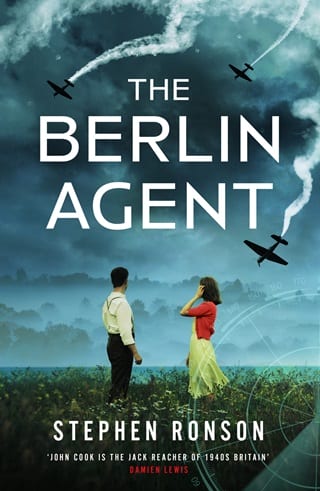81
Miriam led the way along the concrete-lined tunnel. Vaughn followed and I brought up the rear. Our rubber soles had picked up sand and grit from the Forest, and every step was audible on the smooth concrete floor.
Just as when I’d come this way with Bunny, I noticed the upward slope. Soon we came to what Bunny had called the submarine door. I joined Miriam and we looked through the small window. It was dark. Nobody around. So far, so good. The last time I’d been here the whole place had been buzzing with technicians. That mental image had stuck with me, and I’d been expecting it again. But it looked like the -operation shut down for the night. Perhaps this would work. Perhaps we’d get in and out without any problems.
Miriam took hold of the wheel on the door. It turned -easily, a well-oiled mechanism, built and installed with the highest level of craftsmanship. When Bunny wanted to put on a show, he didn’t mess around.
Miriam stopped on the other side of the door, experiencing the same awe I’d felt when Bunny had brought me here.
The cinema , Bunny had called it, a huge art deco lobby. A piece of whimsy from the designer and builders. Generous arches recessed into white plaster walls. There was even a wall of fake film posters, showing square-jawed heroes in army uniforms, swooning heroines, and dastardly villains with swastikas on their lapels.
‘We deciphered radio transmissions talking about the -picture house,’ Miriam said, ‘but we thought we must have got it wrong.’
‘I suppose if you’re building a facility where people are going to be underground all day, you may as well make it uplifting,’ Vaughn said.
‘Not in Germany you don’t,’ Miriam said.
She hurried to a heavy door next to a sign that read:
Strictly No Magnets
‘In here,’ she whispered.
*
The transmitter hummed with electricity, glowing from its rows and rows of dials. Miriam ran her hand lovingly along the Bakelite panels. She found a metal plaque embedded in the main console, and pulled out a notebook to take down details.
Vaughn pulled off his rucksack and delved inside. He pulled out a small pack, wrapped in brown cellophane. It was the size of a half-pound bag of flour.
I grabbed the TNT from his hand and shoved it back in his pack.
‘If you want to blow it up,’ I said, ‘we’ll do it when we know we’re getting clear. We’ll get through the hatch, and drop the explosive back down. All right?’
Vaughn glared at me. He knew I was right, but no man likes to be challenged, especially when his blood’s up.
‘Do as he says, Vaughn,’ Miriam said. She was taking readings from a panel of glowing dials. He obeyed her. She outranked him, I realised. She was the special agent, sent by Berlin. He was just the local fixer.
‘We need to go,’ I said. ‘We’ve been lucky. I don’t want to push it.’
‘I need more time,’ Miriam said.
‘There isn’t more time,’ I replied. Every second we spent here was a second longer than I liked.
‘Two minutes,’ Miriam said.
‘One,’ I countered.
It was arrogance, of course. Bickering gave us the illusion that either one of us was in control. But we were fooling ourselves. When you start thinking you’ve got the mission under control, that’s when it shows you who’s boss. This time was no exception.
I stepped out of the room and checked my watch. Five seconds gone. Fifty-five seconds left. The second hand crawled.
I heard a distant sound and froze. Nothing. Probably my imagination, senses amped up, hearing threats in the silence.
I could try to hurry Miriam, but I’d end up slowing things down. Best to leave her. Let her get the information she needed to take back to Berlin, convince them this was just a radio station.
I heard the sound again. Not my imagination. Not a drill. Rubber-soled boots on painted concrete, crunching over the dirt we’d brought in with us. Ten men at least. Maybe more.
Miriam wasn’t ready. She was furiously copying down readings from a bank of dials in the transmitter room.
‘Miriam,’ I said. ‘Time to go.’
‘I need more time,’ she said.
There was a shout from the long corridor, on the other side of the submarine door. No effort to hide their arrival. Why should they? They had right on their side, and twenty men, probably all armed with rifles. They’d been trained to defend this facility with their lives. Churchill had told them the invasion was about to take place. Now they got to play their part. Defend the homeland or go down trying.
‘Miriam,’ I said, as she ran to another panel of dials.
‘Thirty seconds,’ she said.
‘We’re out of time,’ I said.
 Fullepub
Fullepub 



